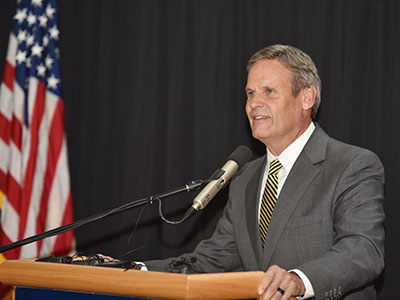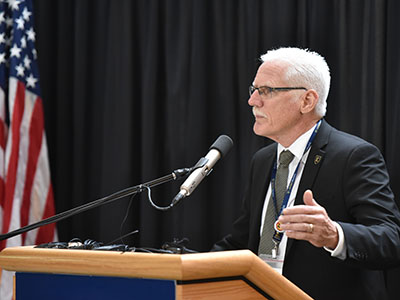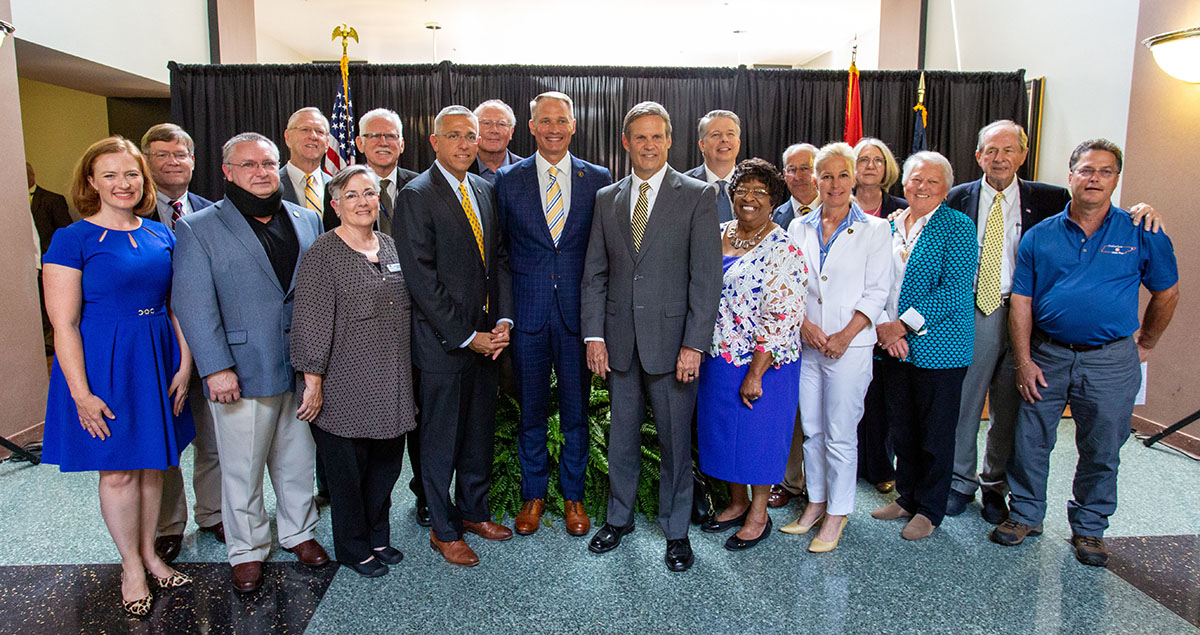Dr. Randy Wykoff, dean of the ETSU College of Public Health, was named the founding director of the new Center for Rural Health Research that will be housed within the college.
Tennessee Gov. Bill Lee announced the creation of the new center on Tuesday, July 16. According to Gov. Lee, ETSU will receive a $1.5 million first-year grant for the implementation of the center, and then a recurring $750,000 annual investment to support the ongoing operations. These appropriations were recommended by Gov. Lee and approved by the Tennessee General Assembly during the 111th legislative session.
In addition, Alan Levine, chairman and CEO of Ballad Health, announced the system would contribute more than $15 million to the center over the course of the next 10 years. The gift is the largest in ETSU history and the largest to date for the $120 million capital “Campaign for ETSU” launched in April.
The goal of the center will be to work with Ballad Health, local health care delivery partners, national experts, and the leadership of ETSU Health to identify new mechanisms to improve health in rural and nonurban communities. Specific emphasis will be placed on strategies that disrupt inter-generational cycles of behaviors that contribute to poor health outcomes, which ultimately can affect college- and career-readiness.
Lee has made workforce readiness a major policy initiative.
“In order for Tennessee to truly lead the nation, we must ensure we help all Tennesseans succeed, particularly in our rural areas,” said Gov. Lee. “One way to help our rural areas is to improve the health outcomes in these areas. Ballad Health and ETSU are leading in this effort, and today’s announcement reflects the State’s commitment to work with them to find solutions.”
The Center for Rural Health Research will identify and work with a range of national experts and with regional health, social service, education and business partners to identify high-impact, evidence-based interventions that could be delivered to every at-risk child born in the Appalachian Highlands region during the next 10 years. Ballad Health has formed the nation’s largest Accountable Care Community, comprised of more than 250 organizations located throughout Southwest Virginia and Northeast Tennessee. Faith-based organizations, school systems, not-for-profit agencies, law enforcement, academic institutions and major employers are all participants in this effort.
Uniquely positioned to study social determinants of health across state lines, the center will also create opportunities for partnerships to form between academic institutions in Tennessee, Virginia and throughout the nation.
“I believe the Center for Rural Health Research at ETSU is going to be a major contributor to solving problems that have been developing in rural America for decades,” said Gov. Lee. “Tennessee will be a leader on this issue, and that continues today, with this partnership between the State of Tennessee, ETSU and Ballad Health.”
During the announcement, ETSU President Dr. Brian Noland introduced Wykoff, who will serve as the founding director of the Center for Rural Health Research, while continuing in his position of dean of the College of Public Health. Wykoff said this announcement is a remarkable step forward for ETSU, Ballad Health, elected officials and many community organizations toward the goal of improving health and well-being in rural areas.
 “We are increasingly recognizing that one of the greatest health challenges for our
region – and our nation – is to interrupt the inter-generational cycles of poor health,
lack of education and persistent poverty,” said Wykoff, who was named dean in 2006.
“The center's mission is to work with regional partners and national experts to interrupt
those cycles quickly, efficiently and affordably.”
“We are increasingly recognizing that one of the greatest health challenges for our
region – and our nation – is to interrupt the inter-generational cycles of poor health,
lack of education and persistent poverty,” said Wykoff, who was named dean in 2006.
“The center's mission is to work with regional partners and national experts to interrupt
those cycles quickly, efficiently and affordably.”
The center will also seek to be a reliable source of information for policymakers, providing evidence-based data from which to help inform policy decisions that can improve health in rural and nonurban communities. It will pursue connections with a range of funding partners to support efforts that advance the health and well-being of residents in these areas.
“ETSU has a proven record in helping to solve problems, particularly on health care, so this is a natural fit for this doctoral and research institution,” Gov. Lee said.
ETSU College of Public Health, the first accredited public health college in the state, is one of the top 10 public health graduate schools in the Southeast and is ranked among the top third schools and programs of public health in the nation by U.S. News. Additionally, the Quillen College of Medicine is one of the top medical schools in the nation for producing physicians in rural America.
“This is a historic day for ETSU and we are grateful to Governor Lee and our partner, Ballad Health, for this significant investment that will help to improve the lives of the people of this region and in rural communities across the nation,” Noland said. “As one of the world’s most respected leaders in public health, Dr. Randy Wykoff has dedicated his entire career to improving health outcomes, and our new center will benefit greatly from his expertise and leadership and his vision for a healthier tomorrow for Tennesseans.”
“Ballad Health and ETSU are deeply committed to action that will improve economic prosperity for rural and nonurban communities, starting with our own region,” said Levine. “Health care institutions do have a role to play in education achievement, and this partnership between the state, ETSU, Ballad Health and other partnerships soon to be developed, will be a relevant contributor to making this change happen.”
“Appalachia is going to lead in developing solutions to many of the challenges facing our rural communities,” added Noland. “This is not a Tennessee problem. It is a national one. I’m pleased that ETSU will lead this academic, research-based effort to solve some of our nation’s most important problems.”
About Dr. Randy Wykoff
Dr. Randy Wykoff is a physician, board-certified in both pediatrics and preventive medicine, with additional training and certification in tropical medicine. His research focuses on the inter-relationship of poverty and health, with a specific interest in how to improve the health status of people living in poor and/or rural areas.
Prior to his current position, he served as senior vice president for international operations at Project HOPE, overseeing health education, disaster response, and humanitarian programs in over 30 countries around the world. He previously served as the deputy assistant secretary for health (Disease Prevention and Health Promotion) in the U.S. Department of Health and Human Services. In this position, he oversaw the release and implementation of Healthy People 2010, and the Surgeon General’s first Call to Action to Prevent and Decrease and Overweight and Obesity, and served for one year as the acting executive director of the President’s Council on Physical Fitness and Sport.
He served for 11 years at the Food and Drug Administration, holding the positions of associate commissioner for AIDS and special health issues, and, later, associate commissioner for operations. In this latter capacity, he served for 18 months as the deputy to the acting commissioner. While at FDA, he also led the Science Team for the Tobacco Working Group, served as the executive director of the National Task Force on AIDS Drug Development, and completed a detail with Sen. Edward Kennedy and the Senate Labor and Human Resources Committee. He began his career as district medical director of the Upper Savannah Health District in the South Carolina Department of Health and Environmental Control, responsible for all public health activities in a rural six-county region.

